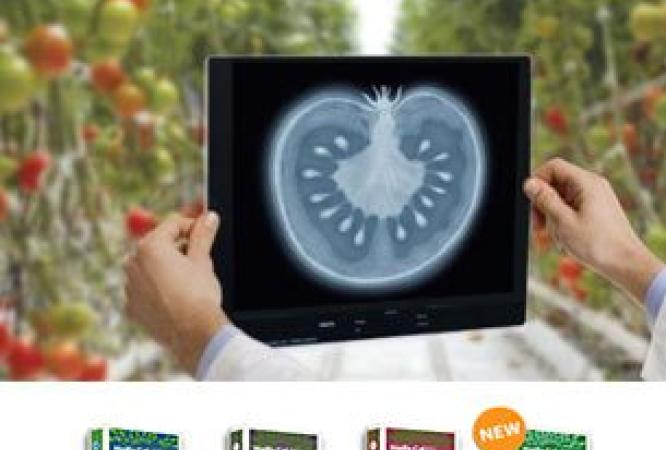1. Fertilization recommendations
The recommendations appearing in this document should be regarded as a general guide only. The exact fertilization program should be determined according to the specific crop needs, soil and water conditions, and the grower’s experience. For detailed recommendations, consult a local Haifa representative.
Disclaimer: Any use of the information given here is made at the reader’s sole risk. Haifa Chemicals Ltd. provides no warranty whatsoever for "Error Free" data, nor does it warrants the results that may be obtained from use of the provided data, or as to the accuracy, reliability or content of any information provided here.
In no event will Haifa Chemicals Ltd. or its employees be liable for any damage or punitive damages arising out of the use of or inability to use the data included.
2. Soil-grown pepper
Haifa fertilization recommendations are available for everyone - enter into NutriNet™, a unique expert software program, that will assist you working out the recommended fertilizer rates at different growth stages according to the expected yield under your growing conditions.
The following is an example of recommendations, determined by NutriNet, with the assumption to split the scheduled fertilization into:
a) Base-dressing (pre-plant) fertilizers, followed by:
b) Nutrigation (fertigation) at different growth stages, on sandy-loam soil, when the expected yield is 65 ton/ha:
a) Base-dressing (pre-plant) fertilizers, followed by:
b) Nutrigation (fertigation) at different growth stages, on sandy-loam soil, when the expected yield is 65 ton/ha:
a) Base-dressing (kg/ha):
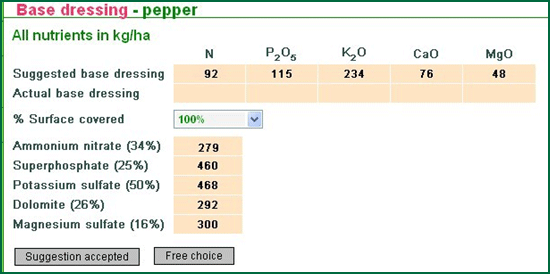


b) Nutrigation
Total amount of fertigation-applied fertilizers (kg/ha)
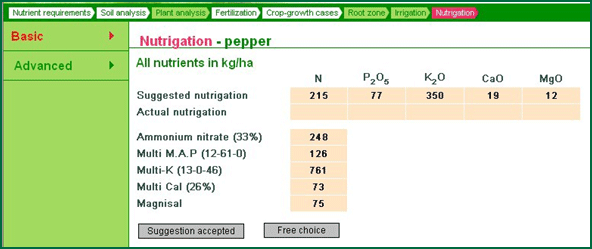
Total amount of fertigation-applied fertilizers (kg/ha)

Table 10: The total contribution of plant nutrients from each fertilizer as calculated by NutriNet™.
Fertilizer | kg/ha | N | P2O5 | K2O | CaO | MgO |
|---|---|---|---|---|---|---|
Ammonium nitrate 34-0-0 | 247.7 | 81.7 | ||||
Haifa MAP™ 12-61-0 | 126.2 | 15.5 | 77 | |||
Multi-K 13-0-46 | 760.9 | 98.9 | 350 | |||
Calcium nitrate (26% CaO) | 73.1 | 11 | 19 | |||
Magnesium sulfate (16% MgO) | 75 | 12 | ||||
Total | 1283 | 215 | 77 | 350 | 19 | 12 |
Table 11: Recommended nutrient rates per ha per day and per growth stage as calculated by NutriNet™.
Phase | Days from sowing/planting | kg/ha/day | kg/ha/phase | ||||||||
|---|---|---|---|---|---|---|---|---|---|---|---|
N | P2O5 | K2O | CaO | MgO | N | P2O5 | K2O | CaO | MgO | ||
Planting | 1 | 1 | 0 | 1 | 0 | 0 | 1 | 0 | 1 | 0 | 0 |
1st phase | 2-30 | 0.66 | 0.24 | 1.07 | 0.07 | 0.03 | 119 | 7 | 31 | 2 | 1 |
Main season | 31-70 | 2.65 | 0.95 | 43 | 0.23 | 0.15 | 106 | 38 | 172 | 9 | 6 |
End season | 71-130 | 1.98 | 0.72 | 3.23 | 0.18 | 0.12 | 119 | 43 | 194 | 11 | 7 |
Total | 2455 | 88 | 398 | 22 | 14 | ||||||
Table 12: Recommended fertilizers rates per growth stage.
Phase | Days from sowing/planting | kg/ha/phase | ||||
|---|---|---|---|---|---|---|
Ammonium nitrate 34-0-0 | Haifa MAP™* 12-61-0 | Multi-K™ * 13-0-46 | Haifa Cal™* (26% CaO) | Magnesium sulfate (16% MgO) | ||
Planting | 1 | 2 | 0 | 2 | 0 | 0 |
1st phase | 2-30 | 23 | 11 | 67 | 8 | 6 |
Main season | 31-70 | 132 | 62 | 374 | 35 | 38 |
End season | 71-130 | 145 | 70 | 422 | 42 | 44 |
Total | 302 | 143 | 965 | 85 | 88 | |
*
 |  |  |
Example: Growing practice of peppers in Israel
Duration of the growth season:
Duration of the growth season:
- In the southern part of the country (dry and hot climate) growth season of pepper in net houses starts on August and ends by the end of April. The season is rather long because of the scarcity of precipitates (ca 70 mm per year).
- The summer growth term starts on April and lasts till the end of December.
- In greenhouses and plastic tunnels the growth season is between August and April.
- In open field the season starts on April and ends on June.
Table 13: NK ratio
Standard pepper plant density in Israel is 30,000 – 35,000 plants/ ha.
Average yield of open-field grown pepper in Israel is 55 – 70 T/ha.
Average yield of net house grown pepper in Israel is 90 – 110 T/ha.
Average yield of open-field grown pepper in Israel is 55 – 70 T/ha.
Average yield of net house grown pepper in Israel is 90 – 110 T/ha.
Kg / ha /Ton pepper yield | |
|---|---|
N | 20-30 |
P2O5* | 27.5 |
K2O* | 48-60 |
Table 14: Open field Pepper fertilization program (Planting on the 1-15 of April).
A. Plant nutrients.
A. Plant nutrients.
Growth phase | Stage duration (days) | kg/ha/day | kg/ha/phase | ||||
|---|---|---|---|---|---|---|---|
N | P2O5 | K2O | N | P2O5 | K2O | ||
First 2 weeks | 14 | 1-1.5 | 1-1.5 | 1-1.5 | 14-21 | 14-21 | 14-21 |
Vegetative Growth | 14 | 2-2.5 | 1 | 3.0-4.0 | 14 | 14 | 42-56 |
Flowering - fruit set | 40 | 3.0-4.0 | 1 | 4.5-5 | 40 | 40 | 180-200 |
Fruit set - harvest | 75 | 2-2.5 | 1 | 3.0-4.0 | 75 | 75 | 225-300 |
Total | 145 | 300-400 | 140-150 | 460-580 | |||
B. Actual fertilizers.
Growth phase | Stage duration (days) | kg/ha/day | kg/ha/phase | ||||
|---|---|---|---|---|---|---|---|
A.N.* | Multi-K®* | Haifa MAP™* | A.N.* | Multi-K®* | Haifa MAP™* | ||
First 2 weeks | 14 | 0.5-1 | 2.5-4 | 3.5-5.5 | 7-14 | 35-55 | 50-75 |
Vegetative Growth | 14 | 0.5-1.5 | 8-14.5 | 3.5 | 7-21 | 110-200 | 19 |
Flowering - fruit set | 40 | 3-5.5 | 12-13 | 3.5 | 120-220 | 480-520 | 140 |
Fruit set - harvest | 75 | 0.5-1.5 | 8-14.5 | 3.5 | 37-110 | 600-1100 | 263 |
Total | 145 | 170-365 | 1225-1875 | 470-495 | |||
* A.N. = ammonium nitrate
Multi-K® = Potassium nitrate
Haifa MAP = Mono-ammonium phosphate
Multi-K® = Potassium nitrate
Haifa MAP = Mono-ammonium phosphate
in open-field, tunnels and greenhouse - Poly-Feed™ water-soluble NPK fertilizers
Table 15: fertilization recommendations for bell pepper in tunnels. Expected yield: 50 ton/ha.
Growth stage | Days | Poly-Feed® formula | kg/ha/day | Total kg/ha |
|---|---|---|---|---|
Initial establishment | 7 | 15-30-15 | 8 | 56 |
Vegetative to fruit set | 20 | 19-19-19 | 13 | 260 |
Fruit set to 1st harvest | 20 | 18-9-27 | 13 | 260 |
Harvest | 100 | 18-9-27 | 13 | 1300 |
Table 16: fertilization recommendations for bell pepper in greenhouse. Expected yield: 120 ton/ha
Growth stage | Days | Poly-Feed® formula | kg/ha/day | Total kg/ha |
|---|---|---|---|---|
Initial establishment | 10 | 15-30-15 | 8 | 80 |
Vegetative to fruit set | 25 | 19-19-19 | 13 | 325 |
Fruit set to 1st harvest | 20 | 18-9-27 | 15 | 600 |
Harvest | 170 | 18-9-27 | 13 | 2210 |
 | 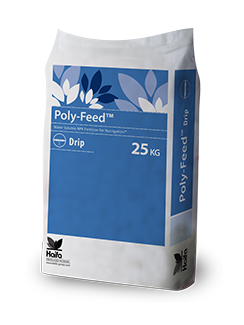 | 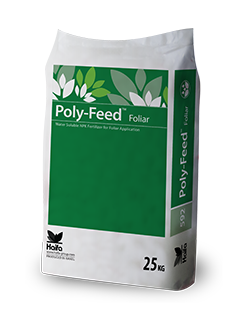 |
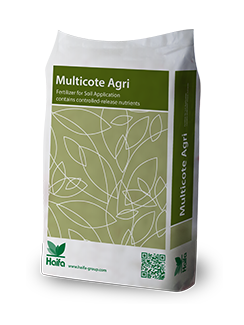 2c. Pepper crop guide: Multicote™ Agri controlled release fertilizers
2c. Pepper crop guide: Multicote™ Agri controlled release fertilizersAn N:P2O:K2O ratio of 2:1:3 is recommended, as pre-plant application. This application will take care of the nutritional requirement of the plot for the entire growth season.
Multicote™ Agri granules should be incorporated into the soil, 10cm deep and 10cm away from the planting row.
Consult a local Haifa representative for detailed explanations and instructions.
Multicote™ Agri granules should be incorporated into the soil, 10cm deep and 10cm away from the planting row.
Consult a local Haifa representative for detailed explanations and instructions.
Table 17: Multicote® Agri application recommendations bell pepper in greenhouse
kg/ha | Analysis | Longevity |
|---|---|---|
2,500 - 3,500 | 17-9-27 | 8 months |
3. Soilless-grown pepper
There are different growth media with different physical and chemical characteristics. The following are general fertilization recommendations for all soilless growth media.
Fertilizer stock solution: Once dissolved, not all fertilizers are inter-compatible with each other. Therefore, they have to be split into two fertilizer tanks: A and B, according to their compatibility. Fertilizers containing phosphorus (P) or sulfur (S) should be dissolved in Tank A only, while fertilizers containing calcium (Ca) or magnesium (Mg) should be dissolved in Tank B.
The concentration of the fertilizers stock solution depends on:
1. The ambient temperature (higher ambient temperature enables higher concentration)
2. The injection rate - how many liters of the fertilizer solution will be injected into each cubic meter (1000 liters) of the irrigated water
Dividing the injection capacity by one cubic meter should be the concentration of the fertilizer solution. If, for example, the injector will deliver 5 L into each cubic meter of the irrigated water
(1000 L / 5 L = 200), the amount of fertilizer dissolved in the tank should be multiplied by 200.
Fertilizer stock solution: Once dissolved, not all fertilizers are inter-compatible with each other. Therefore, they have to be split into two fertilizer tanks: A and B, according to their compatibility. Fertilizers containing phosphorus (P) or sulfur (S) should be dissolved in Tank A only, while fertilizers containing calcium (Ca) or magnesium (Mg) should be dissolved in Tank B.
The concentration of the fertilizers stock solution depends on:
1. The ambient temperature (higher ambient temperature enables higher concentration)
2. The injection rate - how many liters of the fertilizer solution will be injected into each cubic meter (1000 liters) of the irrigated water
Dividing the injection capacity by one cubic meter should be the concentration of the fertilizer solution. If, for example, the injector will deliver 5 L into each cubic meter of the irrigated water
(1000 L / 5 L = 200), the amount of fertilizer dissolved in the tank should be multiplied by 200.
Example I - Holland
The following example was prepared to fit Dutch conditions (low transpiration and low water EC). Considerable and proportional reduction in the concentration of the macronutrients should be practiced at lower water quality prevailing in other conditions.
Table 20: Nutrition database for sweet pepper in Holland, grown on rockwool
Parameter | Nutrient solution (ppm) |
|---|---|
EC (mS/cm) | 2.2 |
N- NH4 | 17.3 |
N- NO3 | 216.9 |
P | 39 |
H2PO4 | 121.3 |
K | 254.2 |
Ca | 190.5 |
Mg | 36.5 |
S, total | 55.5 |
SO4 | 168.2 |
Table 21: Recommended water-soluble fertilizers and their rates, to prepare the above recommended solution:
Fertilizers | g/m3 | Plant nutrients – g/m3 solution | ||||||
|---|---|---|---|---|---|---|---|---|
NO3 | NH4 | P* | K* | Ca* | Mg* | S* | ||
Multi-K® | 500 | 65 | 190 | |||||
K2SO4 | 150 | 63 | 22.5 | |||||
Haifa Cal™ | 1000 | 155 | 190 | |||||
Magnisal® | 120 | 13.2 | 10.8 | |||||
MgSO4 | 260 | 26 | 33.8 | |||||
Haifa MAP™ | 140 | 16.8 | 37.8 | |||||
Total | 233.2 | 16.8 | 37.8 | 253 | 190 | 36.8 | 56.3 | |
Example II – Florida, USA
Table 22: Hydroponic fertilizer solution concentration for growing peppers in a shade house on a composted pine bark medium
Nutrient | Nutrient Concentration (ppm = mg/L) | |
|---|---|---|
Transplant to first flower | After first flower | |
N | 100 | 130 |
P | 50 | 50 |
K | 120 | 200 |
Ca | 100 | 150 |
Mg | 40 | 50 |
S | 50 | 60 |
Table 23: Recommended water-soluble fertilizers and their rates to prepare a fertilizer solution from transplant to first flower and a fertilizer solution after first flower.
A. From transplant to first flower
A. From transplant to first flower
Fertilizers | g/m3 | Plant nutrients – g/m3 solution | ||||||
|---|---|---|---|---|---|---|---|---|
NO3 | NH4 | P* | K* | Ca* | Mg* | S* | ||
Multi-K® | 150 | 19.5 | 57 | |||||
Haifa Cal™ | 530 | 82.15 | 100.7 | |||||
MgSO4 | 400 | 40 | 52 | |||||
Multi-MKP™ | 220 | 49.94 | 61.6 | |||||
Total | 101.65 | 0 | 49.94 | 118.6 | 100.7 | 40 | 52 | |
* conversion factors: P x 2.29 = P2O5 ; K x 1.20 = K2O ; Ca x 1.40 = CaO ; Mg x 1.66 = MgO ;
S x 3.00 = SO4
S x 3.00 = SO4
B. After first flower
Fertilizers | g/m3 | Plant nutrients – g/m3 solution | ||||||
|---|---|---|---|---|---|---|---|---|
NO3 | NH4 | P* | K* | Ca* | Mg* | S* | ||
Multi-K® | 360 | 46.8 | 136.8 | |||||
Haifa Cal™ | 680 | 105.4 | 129.2 | |||||
MgSO4 | 470 | 47 | 61.1 | |||||
Multi-MKP™ | 220 | 49.94 | 61.6 | |||||
Total | 152.2 | 0 | 49.94 | 198.4 | 129.2 | 47 | 61.1 | |
Example III – general USDA recommendations:
Table 24: total nutritional requirements
Nutrient | Nutrient Concentration (ppm = mg/L) | |
|---|---|---|
Transplant to first flower | After first flower | |
N | 70 | 160 |
P | 50 | 50 |
K | 119 | 200 |
Ca | 110 | 190 |
Mg | 40 | 48 |
S | 55 | 65 |
Table 25: Recommended water-soluble fertilizers and their rates to prepare a fertilizer solution
A. From transplant to first flower
A. From transplant to first flower
Fertilizers | g/m3 | Plant nutrients – g/m3 solution | ||||||
|---|---|---|---|---|---|---|---|---|
NO3 | NH4 | P* | K* | Ca* | Mg* | S* | ||
Multi-K® | 80 | 10.4 | 30.4 | |||||
K2SO4 | 60 | 25.2 | 9 | |||||
Haifa Cal™ | 580 | 89.9 | 110.2 | |||||
MgSO4 | 400 | 40 | 52 | |||||
Multi-MKP™ | 220 | 49.94 | 61.6 | |||||
Total | 100.3 | 0 | 49.94 | 117.2 | 110.2 | 40 | 61 | |
B. After first flower
Fertilizers | g/m3 | Plant nutrients – g/m3 solution | ||||||
|---|---|---|---|---|---|---|---|---|
NO3 | NH4 | P* | K* | Ca* | Mg* | S* | ||
Multi-K® | 140 | 18.2 | 53.2 | |||||
K2SO4 | 200 | 84 | 30 | |||||
Haifa Cal™ | 1000 | 155 | 190 | |||||
MgSO4 | 480 | 48 | 62.4 | |||||
Multi-MKP™ | 220 | 49.94 | 61.6 | |||||
Total | 173.2 | 0 | 49.94 | 198.8 | 190 | 48 | 92.4 | |
* conversion factors: P x 2.29 = P2O5 ; K x 1.20 = K2O ; Ca x 1.40 = CaO ; Mg x 1.66 = MgO ; S x 3.00 = SO4
Example IV – Israel
Recommendations are for macro nutrients (N, P & K) by growth stages.
Table 26: Recommendations for nutrient concentrations in irrigation (drip) water for soilless grown peppers in Israel.
Growth Stage | Period | (g/m3) | ||
|---|---|---|---|---|
N | P* | K* | ||
Establishment –3rd flower | Early Fall | 50-60 | 15-20 | 75-80 |
Fruit development and growth | Fall | 80-100 | 25-30 | 100-120 |
Harvesting | Winter | 150-180 | 30-35 | 200-230 |
Harvesting | Early Spring | 140-150 | 30-35 | 160-190 |
Harvesting | Spring-Summer | 120-130 | 25-30 | 150-160 |
Important: EC of irrigation water should be lower than 2.0 mS/cm
Table 27: Required amount of fertilizers to supply the above-recommended nutrients, by growth stages
 A. Establishment to 3rd flower
A. Establishment to 3rd flower
Fertilizers | g/m3 | Plant nutrients – g/m3 solution | |||
|---|---|---|---|---|---|
NO3 | NH4 | P* | K* | ||
Ammonium nitrate | 50-70 | 8.5-11.9 | 8.5-11.9 | ||
Multi-K® | 200-210 | 26-27.3 | 76-79.8 | ||
Haifa MAP™ | 60-80 | 7.2-9.6 | 16.2-21.6 | ||
Sub-total N | 50-70 | 8.5-11.9 | |||
Total | 50.2-60.7 | 16.2-21.6 | 76-79.8 | ||
* conversion factors: P x 2.29 = P2O5 ; K x 1.20 = K2O ; Ca x 1.40 = CaO ; Mg x 1.66 = MgO ; S x 3.00 = SO4
B. Fruit development & growth
Fertilizers | g/m3 | Plant nutrients – g/m3 solution | |||
|---|---|---|---|---|---|
NO3 | NH4 | P* | K* | ||
Ammonium nitrate | 10-130 | 17-22.1 | 17-22.1 | ||
Multi-K® | 260-320 | 33.8-41.6 | 98.8-121.6 | ||
Haifa MAP™ | 90-110 | 10.8-13.2 | 24.3-29.7 | ||
Sub-total N | 50-70 | 8.5-11.9 | |||
Total | 78.6-99 | 24.3 | 98.8-121.6 | ||
C. Harvesting - winter
Fertilizers | g/m3 | Plant nutrients – g/m3 solution | |||
|---|---|---|---|---|---|
NO3 | NH4 | P* | K* | ||
Ammonium nitrate | 200-250 | 34-42.5 | 34-42.5 | ||
Multi-K® | 530-610 | 68.9-79.3 | 201.4-231.8 | ||
Haifa MAP™ | 110-130 | 13.2-15.6 | 29.7-35.1 | ||
Sub-total N | 102.9-121.8 | 47.2-58.1 | |||
Total | 150.1-179.9 | 29.7-35.1 | 201.4-231.8 | ||
D. Harvesting – early spring
Fertilizers | g/m3 | Plant nutrients – g/m3 solution | |||
|---|---|---|---|---|---|
NO3 | NH4 | P* | K* | ||
Ammonium nitrate | 210-200 | 35.7-34 | 35.7-34 | ||
Multi-K® | 42-500 | 54.6-65 | 159.6-190 | ||
Haifa MAP™ | 110-130 | 13.2-15.6 | 29.7-35.1 | ||
Sub-total N | 90.3-99 | 48.9-49.6 | |||
Total | 139.2-148.6 | 29.7 | 159.6 | ||
E. Harvesting - spring - summer
Fertilizers | g/m3 | Plant nutrients – g/m3 solution | |||
|---|---|---|---|---|---|
NO3 | NH4 | P* | K* | ||
Ammonium nitrate | 160-210 | 27.2-35.7 | 27.2-35.7 | ||
Multi-K® | 400-420 | 52-54.6 | 152-159.6 | ||
Haifa MAP™ | 100-110 | 12-13.2 | 27-29.7 | ||
Sub-total N | 79.2-90.3 | 39.2-48.9 | |||
Total | 118.4-139.2 | 27-29.7 | 152-159.6 | ||
* conversion factors: P x 2.29 = P2O5 ; K x 1.20 = K2O ; Ca x 1.40 = CaO ; Mg x 1.66 = MgO ; S x 3.00 = SO4
Pepper crop guide: Poly-Feed™ water-soluble NPKs
Table 28: Recommended composition of nutritional solution for soilless-grown peppers
A. In moderate or cold climate with low sun radiation and soft water (North and North-East Europe, North France, UK, Japan, Korea)
A. In moderate or cold climate with low sun radiation and soft water (North and North-East Europe, North France, UK, Japan, Korea)
Concentration in irrigation water (ppm) | Recommended Poly-Feed® formula | Conc. (kg/m3) | ||||
|---|---|---|---|---|---|---|
N | P | K | Ca | Mg | ||
190 | 45 | 285 | 130 | 40 | 14-10-34+ME | 1.0 |
Some acid and Haifa Cal™ calcium nitrate should be added to adjust the pH and to complete calcium requirements.
B. In hot climate with high sun radiation and hard water (Middle East, Mediterranean countries)
Concentration in irrigation water (ppm) | Recommended Poly-Feed® formula | Conc. (kg/m3) | ||||
|---|---|---|---|---|---|---|
N | P | K | Ca | Mg | ||
170 | 40 | 215 | 100 | 35 | 11-12-33 | 0.8 |
Some acid and Haifa Cal™ calcium nitrate should be added to adjust the pH and to complete calcium requirements.
Need more information about growing pepper? You can always return to the pepper fertilizer .






